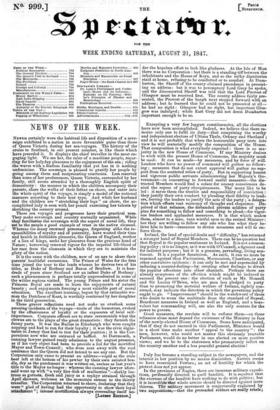Excepting a very few laggart constituencies, all the elections have
now been accomplished. Indeed, we believe that there re- mains only one to fulfil its duty—that comprising the worthy and independent electors of Ultima Thule, Orkney and Shetland-- and it is not probable that when the honourable pony trots into view he will materially modify the composition of the House. That composition is what everybody expected : there is no ma- jority in the new House of Commons. If any Ministry desires to work with the present House of Commons, the majority must be made. It can be made—by measures, and by force of will. Leaders who have no power of command will gather no follow- ing; measures that do not extort approval will gather no sup- port from the scattered relics of party. But in supporting honest and vigorous public servants administering her Majesty's Go-, vernment—in concurring to forward useful measures—the dis- tracted Members would find a solace for uneasy consciences de- nied the repose of party obsequiousness. The many like to be led : it saves them the trouble and responsibility of conviction : they justify their own conduct by pleading their fidelity to lead- ers, leaving the leaders to justify the acts of the party ; a de
tion which effects vast economy of thought and eloquence.
prived of that reliance, the disbanded private soldiers of party. pine for something to follow and oomething to plead—for vigor- ous leaders and applauded measures. It is that which makes them, almost to a man turn wistful eyes to the retired Minister : but they are willing to follow any one who has what they be- lieve him to have—resources to devise measures and will to en- force them.
Ireland, the land of special doubt and "difficulty," has returned a stronger band of Repeal Members. There can he no question but that Repeal is the popular sentiment in Ireland. It is not a reason-
ingpolicy ; it is no longer, as it was with O'Connell, a figment used indirect ndirect purposes ; but it is a genuine, pervading, living sen- timent. It is a popular fanaticism. As such, it can no more be reasoned against than Puritanism, Mormonism, Chartism or any other convulsive epidemic : it can only be met and superseded by inducing a counter-feeling—by, creating other feelings to divert the popular affections into other channels. Perhaps there are already symptoms of the affection which might be induced to succeed the present one : the election of such as Mr. blouse' and Sir Lucius O'Brien, who are men less pledged to party than to promoting the material welfare of Ireland, rightly con- strued, may indicate the direction in which the governing policy ought to go. " Improvement " should be the watchword of those who desire to wean the multitude from the standard of Repeal. Beneficent measures in Ireland as well as England, and a bene- volent but commanding will, are also the only sources for the power to govern.
Good measures, the resolute will to enforce them—on those reliances alone must depend the existence of the Ministry in face of the newly-elected House of Commons. Some have anticipated, that if they do not succeed in this Parliament, Ministers would in a short time make another "appeal to the country " : the men, however, who could not master this obviously tractable Parliament, would do no better in one elected on more positive views; and wo be to the statesmen who prematurely inflict on the country another and a less peaceful general election!


























